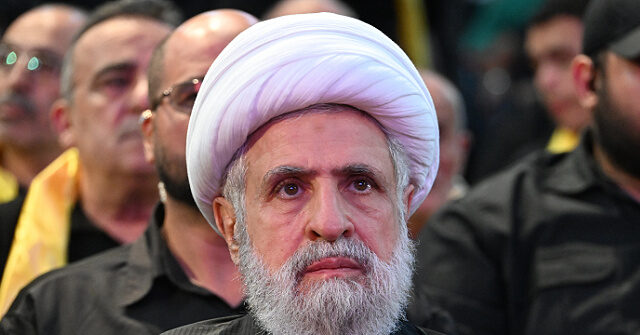Hezbollah deputy leader Naim Qassem said in a televised speech on Tuesday that he was ready to discuss a truce with Israel, without setting any conditions for an end to Israel’s operation against Hamas in Gaza.
The Lebanese terrorist organization appears to have backed away from such demands after the Israeli military eliminated its second leader in two weeks.
Qassem threw his support behind Lebanese parliament speaker Nabih Berri, an ally of Hezbollah but not technically a member. Qassem is the first Hezbollah leader to support a ceasefire with Israel without also demanding an end to the war in Gaza.
Qassem might also be the Hezbollah leader at the moment, depending on the fate of Hashem Safieddine, the most likely successor to longtime dictator Hassan Nasrallah.
Nasrallah was killed by a precision Israeli airstrike on September 28, along with several other top Hezbollah leaders. Nasrallah’s cousin Safieddine, a high-ranking Hezbollah decision-maker and cleric, was seen as his most likely replacement, but the Israel Defense Forces (IDF) may very well have killed him in an airstrike last Thursday, possibly along with the head of the Iranian Islamic Revolutionary Guard Corps (IRGC) Quds Force, Esmail Qaani.
Israeli Defense Minister Yoav Gallant said on Tuesday that Safieddine was “probably” dead, leaving Hezbollah an “organization without a leader.”
Israeli Prime Minister Benjamin Netanyahu more firmly stated Safieddine was dead on Tuesday.
“We’ve degraded Hezbollah’s capabilities, we took out thousands of terrorists, including Nasrallah himself, and Nasrallah’s replacement, and the replacement of his replacement,” Netanyahu said in a message to the people of Lebanon.
It was not immediately clear who Netanyahu was referring to when he said “the replacement of his replacement” was dead, unless he was messing with Qassem’s mind. He might have been talking about Hezbollah budget and logistics chief Suhail Husseini, whose elimination the IDF announced on Tuesday.
“Now you, the Lebanese people, you stand at a significant crossroads. It is your choice. You can now take back your country. You can return it to a path of peace and prosperity,” he said.
“If you don’t, Hezbollah will continue to try to fight Israel from densely populated areas at your expense,” he warned.
Qassem, 71, was the only serious rival to Safieddine as the new Hezbollah boss, so he might have just inherited the top spot by default. He tried to strike a defiant tone in his televised address, insisting Hezbollah’s military capabilities remain effective despite “painful blows” from the IDF.
“Dozens of cities are within range of the resistance’s missiles. We assure you that our capabilities are fine,” he claimed.
“In any case, after the issue of a ceasefire takes shape, and once diplomacy can achieve it, all of the other details can be discussed and decisions can be taken. If the enemy continues its war, then the battlefield will decide,” he said.
Israel’s Ynet News considered it “likely” that Qassem’s announcement was “coordinated with Iran.” In this analysis, the Iranians are desperate to preserve some remnant of Hezbollah they can rebuild into a serious threat in the years to come.
“Although Qassem presents the proposal as Hezbollah’s agreement to a cease-fire, it is clearly a desperate request born out of the group’s difficult circumstances, and may even suggest a tacit admission of defeat. The next step will be watching how Israel and potential mediators respond – and whether Lebanon steps in to help bring an end to the war,” Ynet News postulated.
Qassem’s statement might also have been meant as bait for the Biden administration, which has been almost frantic to position itself as a ceasefire broker and pressure Israel into backing down.
“We’re going to be having regular consultations with the Israelis, with the Lebanese, and others regarding the right moment to press for such an agreement,” White House press secretary Karine Jean-Pierre said on Monday.
Read the full article here
